#charles brooks
Text
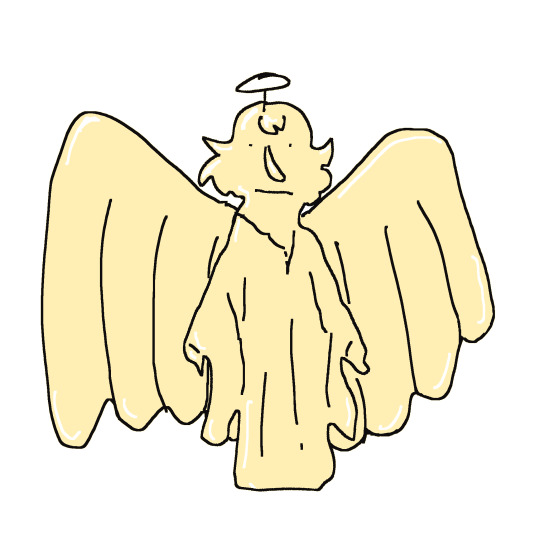

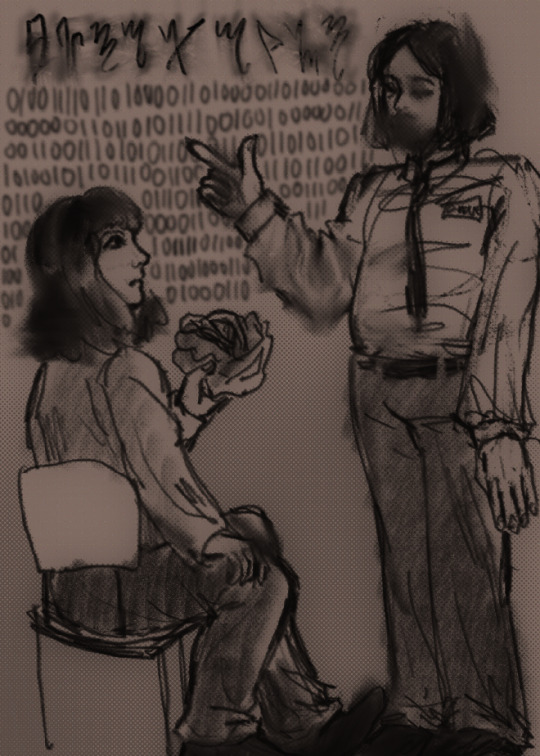
drawings from when I was high off a sleep edible last night
#the walten files#twf#the walten files fanart#twf fanart#art#digital art#procreate#fanart#susan woodings#doodle#charles brooks#rosemary walten#felix kranken#linda thompson#brian stells#sophie walten#twf susan#twf rosemary#twf sophie#twf Linda#twf Felix#twf brian#twf Charles#edd and molly#had fun as u can see#also rest in peace brian#whew#I love how I do anything But sleep even when on the sleep edible#idk why witch Susan is there do not question my ideas while high
238 notes
·
View notes
Text
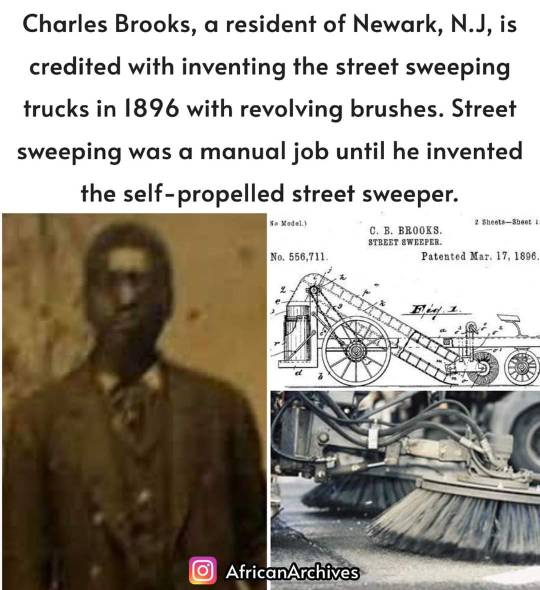
Charles Brooks, a resident of Newark, N.J, is credited with inventing the street sweeping trucks in 1896 with revolving brushes.
Street sweeping was a manual job until he invented the self-propelled street sweeper.
—Street sweeping was often a manual labor job in Brooks' time. Keeping in mind that horses and oxen were the main means of transportation — where there is livestock, there is manure. Rather than stray litter as you might see today in the street, there were piles of manure that needed to be frequently removed regularly. In addition, garbage and the contents of chamber pots would end up in the gutter.
The task of street sweeping was not carried out by mechanical equipment, but rather workers who roamed the street sweeping garbage up with a broom into a receptacle. This method clearly required a lot of labor, although it did provide employment.
#Charles Brooks#black inventor#self propelled#street sweeper#read more about him#reading is fundamental#knowledge is power#black history#african american history
255 notes
·
View notes
Text

Charles in my furry au!!!! idea of him being a beaver was thought up by my gf ^_^
also will be doing Jenny in this au soon I saw ur anonymous question dw.... 🫡
#art#my art#fanart#doodles#dinosaur#furry#furry art#the walten files#the walten files charles brooks#the walten files charles#charles brooks#charles twf#charles brooks twf#twf charles brooks#twf charles#twffurryau#the walten files fanart#twf fanart#twf#furry fandom#beaver#furry beaver#beaver furry#anthro#anthro beaver
43 notes
·
View notes
Text
Jack: One of you will betray me.
Susan: Is it me Jack?
Jack: No.
Charles: Is it me Jack?
Jack: It's not you either.
Felix: Is it me Jack?
Jack: ...Is iT Me JaCk?
#jack walten#the walten files#the walten files incorrect quotes#felix kranken is the absolute worst character#susan woodings#charles brooks
50 notes
·
View notes
Text













Charles Brooks (New Zealand based photographer)
Architecture of Music - inside musical instruments:
14k Burkart Elite Rose Gold Flute
The Cello Once Hit By a Train
1995 Low C Prestige Bass Clarinet, Part 2
1995 Low C Prestige Bass Clarinet, Part 1
Charles Theress Double Bass
St.Marks Church Pipe Organ, Part 2
St.Marks Church Pipe Organ, Part 1
Hopf Violin - c.1880
The Exquisite Architecture of Steinway, Part 1
Australian Didgeridoo
Lockey Hill Cello - c.1780
1940s Selmer Balanced Action Saxophone
Fazioli Grand Piano, Part 2

29 notes
·
View notes
Photo







“Architecture in Music” series,
Photographs: Charles Brooks
#art#photography#surreal#instrument#music#piano#violon#charles brooks#architecture#inside#flute#underwworld#hidden world
40 notes
·
View notes
Text
Christ Commanded Us To Forgive

by Charles Brooks (1795–1872)
And forgive us our debts, as we also have forgiven our debtors
- Matthew 6:12
By “our debtors” are intended those, who, in any respect, injure us, either in our persons, reputation, interest, or comfort. The Christian duty of forgiveness does not require a stoical or affected insensibility of such injurious treatment; for the gospel aims to regulate, not to extinguish the innocent feelings of our nature. Nor does the duty forbid our expressing to the injurious party a proper indignation and grief at his misconduct, and prudently attempting his conviction and amendment—on the contrary, the Scriptures enjoin us to go to our offending brother, and privately tell him his fault: its direction is, “You shall not hate your fellow countryman in your heart; you may surely reprove your neighbor, but shall not incur sin because of him” [Leviticus 19:17 NASB]—Nor does the duty in question prohibit us seeking satisfaction from those who have injured us. The laws of God, of self preservation, and of civil society warrant us, in such cases, to do justice to ourselves. The laws of Christianity require the injurious person to go and make satisfaction to his offended brother, and even to defer the performance of religious worship till he has honestly attempted this reconciliation.
The duty of forgiving offenders, implies, in the first place, that we really love them notwithstanding their pernicious conduct. We are to distinguish between the person and the fault; and to feel that he may become a good man, and then a good friend… The indulgence of an angry, sullen, malicious disposition towards an offender, is strictly forbidden. It is as remote from Christian forgiveness, as darkness is from light.
Secondly —this duty implies, a sincere desire and a resolved pursuit of the welfare of those who have injured us; and a heartfelt satisfaction in their amendment, and in their temporal and spiritual prosperity. He who thirsts for revenge or exults at the misfortunes of an offender has not the Christian spirit.
Thirdly—this duty requires a readiness of mind to confer with the offending party, to be reconciled to him on mild and equitable terms; and on his offering due satisfaction, to comfort him with the swift and frank assurance of our forgiveness and kindness. He who is only forced into reconciliation, betrays dark symptoms of latent enmity. The gospel requires a forgiving spirit and this spirit must be fixed, habitual and ready—not blind, and yet without wrath; not precipitate and yet free.
6 notes
·
View notes
Text



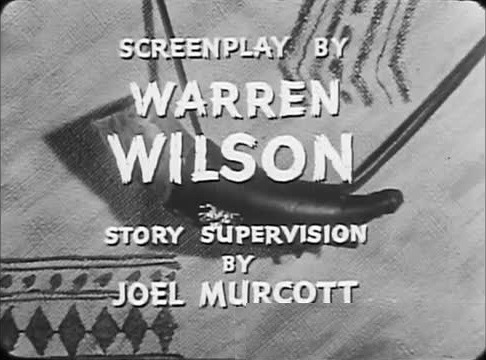

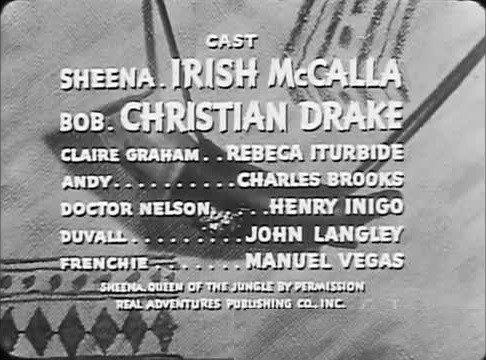










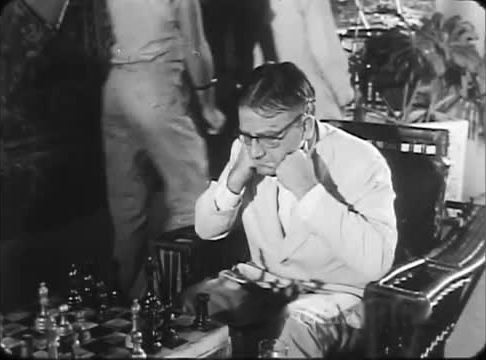


From the Golden Age of Television
Series Premiere
Sheena - Queen of the Jungle - Crash in the Jungle - Syndication - September 1, 1955
Action Adventure
Running Time: 30 minutes
Written by Warren Wilson
Produced by Edward Nassour
Directed by Carl K. Hittleman
Stars:
Irish McCalla as Sheena
Christian Drake as Bob Rayburn
Rebeca Iturbide as Claire Graham
Claudio Brook as Andy Howard (as Charles Brooks)
Heny Inigo as Doctor Nelson
John Langley as Duvall
Manuel Vegas as Frenchie
#Crash in the Jungle#TV#Sheena: Queen of the Jungle#Action Adventure#1950's#1955#Syndicated#Irish McCalla#Christian Drake#Rebeca Iturbide#Charles Brooks#Series Premiere
1 note
·
View note
Text


4x11 It's Love, Actually
1 note
·
View note
Text

“St. Marks Pipe Organ, Part 2.”
Architectonic Photographs by Charles Brooks Illuminate the Atmospheric Interiors of Historic Instruments
Architecture in Music series
All images © Charles Brooks

“Charles Threress Double Bass c. 1860.”

“1995 Low C Prestige Bass Clarinet”

Left: “Lockey Hill Cello c. 1780.” Right: “The Exquisite Architecture of Steinway, Part 8,” Steinway Spirio R piano

“Taylor GS Mini Guitar”

“Pianola”
#charles brooks#photographer#architectonic photography#atmospheric musical instruments interiors#historic instruments#music#architectecture in music photo series
0 notes
Text

happy twf 4 day !!!!!!!!!!!!
#my art#fanart#the walten files#jack walten#felix kranken#rosemary walten#susan woodings#charles brook
2K notes
·
View notes
Text
Christ Looked to the Future

by Charles Brooks (1795–1872)
Jesus said, “Father, forgive them, for they do not know what they are doing”
- Luke 23:34
This prayer was uttered while they were nailing our Savior to the cross. There is here a moral sublimity in Christ’s fortitude, compassion and piety, which you cannot find in the philosophers, legislators, or heroes of ancient or modern days. This prayer was no momentary flight of enthusiasm. The life and death of Jesus were, both of them, wonderful and consistent. He who at the beginning of his ministry said, “Love your enemies and bless them that curse you;” now in his extreme agony on the cross, prays, “Father forgive them.”... Did ever man, before, speak, think, act and feel, like this man?
...Is it not, then, a most humiliating thought, that we who can occasionally glow with admiration and melt with tenderness at the review of our Savior’s life and sufferings, should yet so often fall short of him in our temper and actions? Can a Christian be vainglorious, proud, revengeful and unforgiving? Can the follower of the prince of peace, mingle in strife? Can the doctrines of eternal love be conjoined with envenomed rancor? And why this lukewarm attachment? these divided affections? but from the want of that entire conviction and that deep impression of gospel truth, which overawes the passions and brings every thought into subjection?
The faith of Christ sustained him....If you would see extreme misery without hope, cast your eye at the impenitent thief. Here you behold an awful contrast.
Christ’s trust in a future recompense supported him. His death showed the spontaneous tenor of his soul, and his conduct was a [fitting] close to his eventful and unspotted life.
If the Savior’s example carries no practical influences to our hearts, we are lost to the most tender sympathies of our nature....to be happy with him where he is, we must be on earth what he was. We must be, like him, steadfast to the cause of truth and piety, however unsupported and opposed— we must manifest unshaken friendship to mankind, though requited by their enmity— and adore the goodness of God, notwithstanding clouds and darkness surround his throne.— Let us prepare for sufferings; and when we enter our garden of Gethsemane, let our heartfelt prayer be, Father, not as I will, but as you will.
4 notes
·
View notes
Text

so. walten files am i right fellas
#my art#“art.” i shat this out in like 5 minutes tops#the walten files#twf#jack walten#felix kranken#charles brook#JACK IS NOT HOMOPHOBIC!!!!!!!!!!!! he just doesn't know how to tell em#its always two bicurious dudes telling each other “exactlyyyyy”#sorry everyone that followed me for actual art i've been fighting the artblock demons
345 notes
·
View notes

